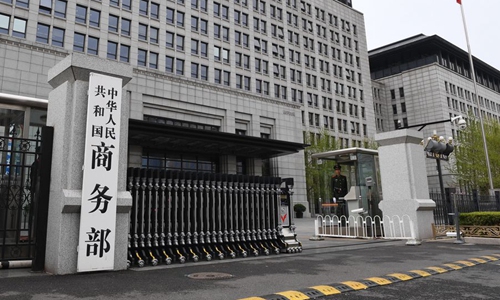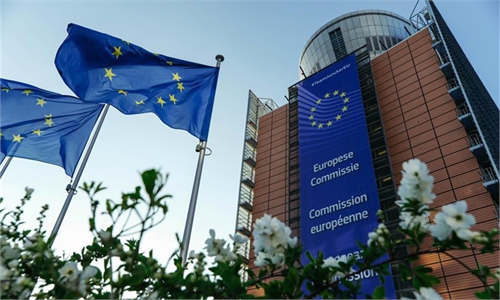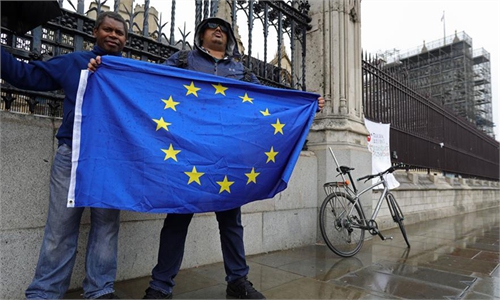China calls on EU to correct discriminatory practices against Chinese firms: Commerce Ministry

Photo shows the entrance to the Chinese Ministry of Commerce (MOC) in Beijing, capital of China. Photo: Xinhua
China is calling on the EU to correct its discriminatory practices against Chinese companies, and will take necessary measures to safeguard the legitimate rights and interests of Chinese firms, said the Ministry of Commerce on Thursday in response to EU's Monday decision to take countervailing measures against glass fiber fabrics originating in China and Egypt.
Analysts said the trade dispute will not have much impact on the ongoing negotiations of the bilateral investment treaty (BIT) between China and the EU. But EU's failure to act in accordance with the principles of the WTO, together with US' opposition will challenge the WTO's framework.
The EU issued a final ruling on its website on anti-subsidy investigations of glass fiber fabrics originating in China and Egypt on Monday, under which glass fiber fabrics from China were subject to countervailing duties of between 17 percent and 30.7 percent, and 10.9 percent on similar products from Egypt.
The Commerce Ministry said the countervailing investigation and ruling are seriously inconsistent with WTO rules and EU's countervailing regulations.
Bureau chief of the Trade Remedy and Investigation Bureau of the Ministry of Commerce (MOFCOM) said that the EU took the differences between China and the EU in terms of system and national conditions as the reason for its discriminatory and unfair policies and measures, and disregarded China's great achievements in financial reform and market-oriented construction.
"The EU is indeed violating a WTO rule that subsidies should be provided locally. In fact, EU expanded the concept of subsidy in the countervailing case of the glass fiber fabrics that included a third country, which is the root cause of the disagreement between China and the EU," Pang Chaoran, an associate research fellow at the Chinese Academy of International Trade and Economic Cooperation, told the Global Times on Thursday.
The EU mistakenly identified Chinese companies as public institutions or agencies entrusted by the government, regardless of the status of China's financial institutions and enterprises as independent market entities, said MOFCOM official. "The investigation process has brought a lot of unnecessary and excessive burden to the respondent enterprises on the wrongly identified subsidy," the official added.
The EU's ruling goes against the EU's own policy on economic and trade cooperation with African countries and its developing members, MOFCOM noted.
But analysts say there will be a slight impact on BIT as both China and EU have said they expect to complete negotiations within the year.
"Anti-dumping and countervailing investigations are mainly at the trade level and will not have much impact on negotiations at the investment level - the BIT. However, some differences in trade may affect the economic, political or diplomatic relations between the two sides. Thus, it is possible that the investment negotiations may be affected," said Pang.
Hu Qimu, a senior fellow at Sinosteel Economic Research Institute, said that the glass fiber case is just a strategy being used by the EU to increase its bargaining power during BIT negotiations.
"Countervailing duties are a perennial topic in China-EU trade and there are many such cases every year. I don't think it will affect the BIT negotiations. China and Europe need each other's markets." Hu told the Global Times on Thursday.
The EU's failure to act in accordance with the principles of the WTO and the US' explicit opposition to the WTO indicate that the WTO framework may indeed have to be restructured in the future, Hu noted.


